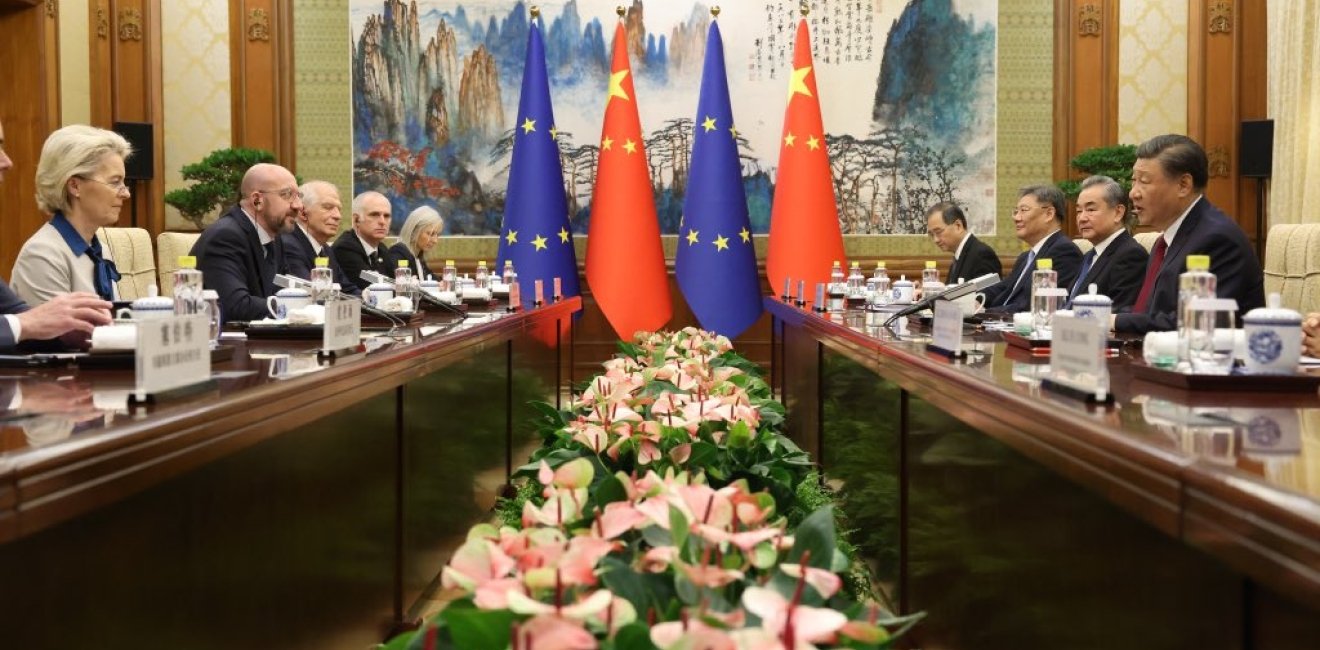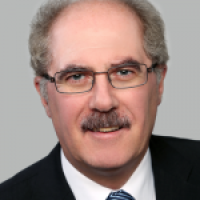The 2023 EU-China Summit – A Lukewarm Affair But No Disaster
In this article, Wilson Center expert Klaus Larres, analyses what the events and outcomes of the EU-China summit mean for EU’s and China’s relationship moving forward.
In this article, Wilson Center expert Klaus Larres, analyses what the events and outcomes of the EU-China summit mean for EU’s and China’s relationship moving forward.

The 2023 EU-China summit on December 7 in Beijing ended without a dramatic clash of views but also without much agreement. The summit did not do any harm, it seems, but it did not lead to any major results either. Ursula von der Leyen, President of the European Commission, and Charles Michel, President of the European Council, probably expected as much. In her opening statement von der Leyen asked Chinese President and Chinese Communist Party (CCP) chairman, Xi Jinping, for a “frank and open exchange” of views and it seems that is what she got, once the doors closed for the two-part meeting.
The EU pair, accompanied by the High Representative of the European Union for Foreign Affairs and Security Policy, Josep Borrell, first met with Xi and then after lunch with the new premier Li Qiang. At both meetings the elephants in the rooms were the United States and Russia. In what has almost become a tradition by now, the Chinese leaders attempted to do their best to drive a wedge between the transatlantic allies by warning the EU leaders against “all kinds of interference” from outside powers, such as the United States and its latest export curbs on high-end artificial intelligence chips and chipmaking tools.
In turn, the two EU presidents tried to persuade Xi to drop his support for Russia’s war against Ukraine and persuade Putin to withdraw his troops. China’s position regarding Russia’s aggression would define the EU’s relationship with China, von der Leyen told a news conference after the summit but Xi remained unswayed, as far as we know. China buys huge amounts of Russian oil at discounted prices and is providing Moscow with drones, microchips, and other dual-use goods, which may well classify as military aid. Wang Luton, the director-general for European affairs in the Chinese foreign ministry, suggested at a later press conference that the EU countries should talk to Putin themselves, if they wanted to bring about an end to the war.
Trade and market access matters were at the core of the first EU-China summit to be held in four years. After all, both Europe and China are in economic difficulties and both sides know that they need each other. Europe is under increasing pressure due to the financial and military demands of the Ukraine war, increasing social policy expenditures and declining industrial creativity.
Xi is greatly upset about the difficulties caused by US and European high-tech export controls and grapples with very high youth unemployment (which is still increasing), a looming demographic crisis, and not least the collapse of the property bubble. Just before the summit meeting Xi learned that the government in Rome had pulled out of the Belt and Road Initiative (BRI), a humiliating blow as Italy was the only G7 country which had ever joined the BRI.
In their meetings with the Chinese leaders, von der Leyen and Michel bitterly complained about the massive EU trade deficit with China, which ran at almost 400 billion euros in 2022. They told them that this was not sustainable and the very fact that the trade deficit had doubled during the last two years showed that irregularities were at play. Beijing needed to fix this situation as a matter of urgency.
Not surprisingly, Xi dismissed this. Many exports to the EU actually originated from European-owned factories in China. Moreover, the trade deficit in 2023 had already declined by some 17 percent compared to the previous year. China’s industries were developing rapidly due to their high innovation abilities and there was no overcapacity and no unfair subsidies of EV vehicles in China. These products were needed and would help the green transition in Europe. And in any case the EU was heavily subsidizing the European battery industries.
The EU fears, however, that China will soon flood the EU countries with even more low-cost goods such as solar panels, wind turbines, medical devices, and more subsidized electric cars. EU trade experts are convinced that low consumer demand in China, enormous state subsidies for these goods, and the re-direction of massive bank lending from the property sector to EV vehicles as well as a great lack of fair market access for EU companies have led to a significant overcapacity which China now needs to export. The EU estimates that the Chinese state makes a loss of up to $30,000 for each China-made EV vehicle sold in Europe. Last September, von der Leyen initiated an EU investigation into Chinese subsidies for EV cars. The high tariffs imposed by the US and other non-EU countries, makes the EU the only sizable market available for the Chinese low-cost export drive regarding EV cars.
While the EU “prefers to have negotiated solutions,” von der Leyen indicated that the Europeans had “tools to protect our market.” The European Commission President, whose first term in office is ending soon, was clearly referring to the imposition of tariffs. “Politically, European leaders will not be able to tolerate that our industrial base is undermined by unfair competition,” she told Xi. She repeated that the EU was not interested in de-coupling from China – but “de-risking” and “diversifying” supply chains was necessary to make the EU economies more resilient.
Outgoing European Council President Michel referred to Beijing’s export curbs on critical minerals, such as graphite which is essential for the EU defense industries. Upholding European “sovereignty and strategic autonomy” thus made a “de-risking” policy utterly necessary. And incidentally Beijing had started this trend, the two EU leaders pointed out, when China announced its “dual circulation strategy” some three years ago. With this policy, China had tried to rely more on domestic consumption and home-made technology rather than on exports and high-tech goods from abroad.
Michel and von der Leyen also presented details of 13 Chinese companies to Xi which sell EU-made dual-use products to Russia and thus avoid the European sanctions put on Moscow. They expect Beijing to take “appropriate action” otherwise these Chinese companies will also be sanctioned as part of the 13th sanctions package on Russia, which is currently being debated in the European Parliament.
The meeting was indeed quite “candid” as Beijing later expressed. Von der Leyen and Michel also raised serious human rights issues in Xinjiang, Tibet, and Hong Kong though they were delighted that the EU-China Human Rights Dialogue had commenced again. The two EU leaders expressed their concern about the rising tensions in the Taiwan Strait but also reiterated the EU’s consistent One China policy. The Israel-Hamas War was also discussed.
And both sides were also able to agree on a number of issues, such as their mutual interest in the continued cooperation on climate change and the environment, and Beijing’s commitment to deal with the rising emission of methane. They also agreed to cooperate on global health issues and working out global rules and standards for AI. Both sides welcomed the establishment of working groups on exports controls, wines and spirits, cosmetics, food safety, intellectual property rights, and financial regulation.
China had pressed for the relaunching of High-Level People-to-People Dialogue (HPPD) next year and this was agreed. First initiated in 2012, the HPPD consists of meetings of decision-makers and practitioners in various civil society and cultural fields. Agreement was also reached regarding the controversial issue of the ambiguous Chinese rules for data transfers. Beijing agreed to publish guidelines to provide greater transparency regarding how western companies can transfer their data out of China without running the danger of breaking any laws and rules.
Nevertheless, this was a difficult and contentious summit. Regarding the essential topics such as how to deal with the continuing lack of market access for EU companies, the EU’s huge trade imbalance with China, and Beijing’s dubious support for Russia’s war on Ukraine (China has still not condemned Moscow’s aggression), no agreement was reached. There was no joint communiqué at the end. Both sides merely held separate press conferences.
Yet, among all the tension and distrust of the last few years the summit did take place and both sides engaged and spoke to each other quite openly, and without falling out with each other. It is questionable, however, whether this will be enough to bring about “the foundation of a constructive relationship,” which von der Leyen stated to Xi Jinping as the goal with a degree of polite optimism at the outset of the 2023 EU-China summit.


The Global Europe Program is focused on Europe’s capabilities, and how it engages on critical global issues. We investigate European approaches to critical global issues. We examine Europe’s relations with Russia and Eurasia, China and the Indo-Pacific, the Middle East and Africa. Our initiatives include “Ukraine in Europe”—an examination of what it will take to make Ukraine’s European future a reality. But we also examine the role of NATO, the European Union and the OSCE, Europe’s energy security, transatlantic trade disputes, and challenges to democracy. The Global Europe Program’s staff, scholars-in-residence, and Global Fellows participate in seminars, policy study groups, and international conferences to provide analytical recommendations to policy makers and the media. Read more


The Kissinger Institute works to ensure that China policy serves American long-term interests and is founded in understanding of historical and cultural factors in bilateral relations and in accurate assessment of the aspirations of China’s government and people. Read more


